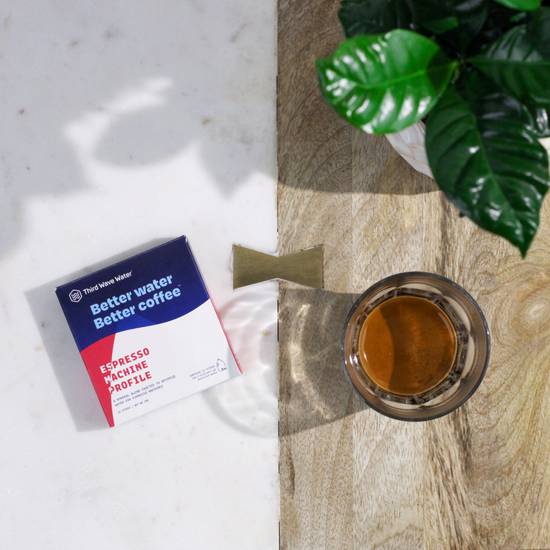Third Wave Water: The Best Choice for Water

The foundation of all coffee extraction starts with using good-quality water. While this isn’t the first thing the home barista considers when purchasing a new espresso setup, it should be. The water you use in your espresso machine impacts the flavor of your coffee and, equally as necessary, the longevity and overall health of your espresso machine. Most repairs that come through Clive’s repair department result from using hard water, causing essential parts to fail early and present costly repair bills that could have been avoided. Third Wave Water, the leading water quality savant in the industry, is ensuring a successful start to your espresso journey by including TWW espresso profile, a TDS meter, and Coffee School’s Water 101 with the purchase of a Rancilio Silvia or Silvia Pro X espresso machine for the entire month of September.
Please take care to bookmark our handy primer on water for espresso.
Third Wave Water Mineral Packets

Now, then, let’s talk about formulating our own water first. We discussed how TWW mineral packets are meant to help protect your machine and help produce the best flavor possible, but it’s also about brew-to-brew consistency. Let’s get started:
- Add one packet of TWW espresso profile to one gallon of distilled water or reverse osmosis water.
- Mix the minerals thoroughly until dissolved.
- Test with a TDS meter
- Brew and enjoy!
Making sure your coffee is tasting its best is incredibly easy! You can also decide not to use the entire packet of minerals. Some folks will also make their own concoction of minerals and water ratios. For this, the TDS meter is an essential tool to have. Coffee School’s Water 101 goes into much more detail about the minerals themselves and how they affect flavor.
What does a TDS meter measure, and do I need one?

A TDS meter measures the total dissolved solids or the amount of minerals present in the water you are testing in ppm (parts per million). The TDS meter measures the conductivity of the solution and estimates the TDS from that reading. It is important to remember that this device does not tell you which minerals are in your water, just that an aggregate is present. A TDS meter will not test for heavy metals like lead, the PH, or if there is chlorine in your water. Suppose you are using tap water, mineral water, spring water, bottled water, well water, or any kind of water going into your machine that is not reverse osmosis or distilled. In that case, you should get a more comprehensive water test or contact your municipal water board for more information about your area’s water.
A TDS meter is helpful when periodically testing your water for TDS, formulating your own water, or using TWW with reverse osmosis or distilled water as a base.
Rancilio: Which machine is for me?
The main things to consider here are the drinks you’d like to make, the workflow you want, your budget, and if you have any footprint limitations. They both look the same but are functionally very different.

The single boiler affectionately known as Miss Silvia by its passionate community of users and modders is a kitchen counter mainstay. The Silvia is ideal for folks looking to get a starter machine or if they mainly want to pull espresso shots. Since it’s a single-boiler, you can only steam milk in steps, so if you’re a hardcore cappuccino drinker, the switch may be limiting for you.

This dual-boiler unit provides cafè quality steam texture and temperature stability. For those looking for temperature stability and more precision controls, the digital PID helps you control brew and steam temperatures down to the degree and doubles as a shot timer. The Pro X gives your morning a more professional air.
Now that you’re armed with knowledge about using water correctly with your espresso machine, you have no excuse but to use good water. It’s a no-brainer. Use Third Wave Water for better-tasting coffee.